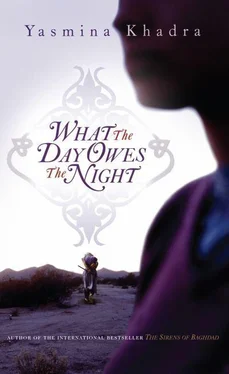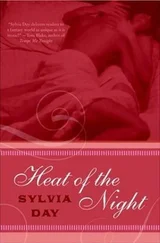On the Feast of the Ascension, Jérôme took Lucette and me to the top of Djebel Murdjadjo to see the city. We visited the medieval fortress on the mountaintop before joining the crowds of pilgrims flocking to the basilica of Our Lady of Santa Cruz. There were hundreds of them: women, old men and children, all milling around the base of the statue of the Virgin Mary. Some had come up the mountain barefoot, clutching at the broom and the bushes for support; others had climbed up on their knees, which were now scratched and bleeding. The pilgrims stood under the blazing sun as though in a trance, their eyes rolled back in their heads, their faces pale, imploring their guardian angels, beseeching the Almighty himself to spare their miserable lives. They were Spaniards, Lucette explained, and they made the pilgrimage every year to give thanks to the Virgin Mary for sparing Oran from the cholera epidemic of 1849 that had wiped out thousands of families.
‘But look at them,’ I said, shocked by the extent of their self-inflicted injuries.
‘They do it for God,’ Lucette said fervently. ‘God never asked them to do this,’ Jérôme interrupted, and his voice, like a whip crack, put paid to my curiosity. I no longer saw these people as pilgrims, but as cursed souls. If truth be told, Hell never seemed closer than it did to me on holy days. All my life I had been warned of the evils of blasphemy. Nor did you to have to utter a blasphemy to be damned; simply to overhear it was a sin. Lucette sensed that I was upset. I could see that she was angry with her father, but I couldn’t bring myself to respond to her embarrassed smile. I wanted to go home.
We took the bus back to the city, but the twisting cliff roads to Vieil Oran simply made me feel worse. At every bend in the road I thought I might be sick. Whereas usually when we were in the old town, Lucette and I liked to wander around La Scalera, eat paella or a caldero in a cheap Spanish café or buy trinkets from the Sephardic craftsmen in the old Jewish quarter, that day my heart wasn’t in it. What Jérôme had said had cast a pall over the day. I feared his blasphemy would bring about some catastrophe.
We took the tram back to the European sector of the city and then walked home. The weather was magnificent, and yet the sunlit streets felt strange and dreamlike. Lucette squeezed my hand, but I could not seem to wake up.
And then the catastrophe I had feared hit me like a thunderbolt. Our street was teeming with crowds of people; all the neighbours had come out and were standing around, arms folded across their chests. Jérôme gave a puzzled look to a man in shorts standing at his gate, who had clearly been watering his garden. The man turned off the hose and set it down, wiped his hands on his shirt, then spread them wide to indicate his bafflement.
‘There must be some mistake. The police have arrested Monsieur Mahi, the chemist. They’ve just taken him away in a police van. The cops didn’t look too happy.’
My uncle spent a week in custody. When he was finally released, he waited until dark before he dared to come back to the house. His face was gaunt, his eyes lifeless, the few short days he had spent in jail had changed him completely. He was barely recognisable. An unkempt beard emphasised his pallor, making him look like a ghost. He looked as though he had not eaten or slept in prison.
Germaine’s relief at her husband’s return was short-lived when she realised that he had not been returned to her whole. My uncle seemed to be in a constant daze. He found it difficult to understand what was said to him; he jumped if Germaine asked whether she could get him; anything. At night I heard him pacing up and down, mumbling and cursing. Sometimes, when I looked up from the garden, I would see him standing at the window, framed behind the curtains, constantly scanning the street as though expecting the Devil himself to arrive.
Forced to take over the running of the business, Germaine now had little time to spend on me. She was terrified – her husband was having a breakdown and refused to see a doctor. Sometimes she would stand, sobbing, in the middle of the living room.
Jérôme took over responsibility for taking me to school. Every morning, smiling and cheery, her hair in ribbons, Lucette would call for me. She would take my hand and we would run to catch up with her father at the end of the street.
I assumed that after a few weeks my uncle would be back to his old self. Instead, he got worse. He began to lock himself away in his study and would refuse to open the door when we knocked. It was as though there was an evil spirit in the house. Germaine was frantic. I was mystified. Why had my uncle been arrested? What had happened at the police station? Why would he not talk about what had happened in custody, even to Germaine? The secrets a house is desperate to conceal will, sooner or later, be shouted from the rooftops. A cultured, well-read man, aware of the upheavals in the Arab world, my uncle had been a supporter on an intellectual level of the nationalist cause spreading through educated Muslim circles. He had learned the speeches of Shakaib Arslan by heart, cut militant articles out of the newspapers that he catalogued, annotated and wrote dissertations on. Obsessed with the theoretical aspects of political upheaval, he had not realised the risks of his actions. All that he knew about political activism were his flights of rhetoric, the secret contributions he made to fund workshops, the clandestine night-time meetings at our house. Though committed to the cause of Algerian nationalism, he was drawn to the principle rather than to the radical activism espoused by members of the Parti du Peuple Algérien. It would never have occurred to him that he would ever set foot inside a police station, let alone spend the night in a stinking cell with rats and thugs for company. My uncle was a pacifist, a hypothetical democrat, an intellectual who put his faith in words, in demonstrations, in slogans, with a visceral hatred of violence. He was a law-abiding citizen, keenly aware of the social standing conferred on him by his university education and his profession as a chemist. He could never have imagined that the police would come for him one night while he was sitting in his armchair, feet up on an ottoman, reading El Ouma, the party newsletter.
The gossips said that before the police even put him in the van my uncle was a broken man, that he had confessed everything he knew as soon as he was questioned. They said that it was only because he had been so co operative that the police released him without charge – an allegation he would deny to his dying day. Unable to bear the gossip and the slander, he suffered several breakdowns.
When he recovered some measure of sanity, he told Germaine what he had planned: there could be no question of us going on living in Oran. We had to move.
‘The police are trying to turn me against my own people,’ he confided wearily. ‘Can you imagine? How could they think that they could ever get me to do that? Do I look like a traitor, Germaine? For the love of heaven, how could I possibly inform on my friends, my colleagues . . . ?’
From now on, he told her, he would be under constant surveillance, something which in itself would put his friends in danger.
‘Do you at least have somewhere in mind?’ Germaine asked, clearly devastated at the idea of having to leave her home town.
‘We’ll move to Río Salado.’
‘Why Río Salado?’
‘It’s a quiet little town. I went there the other day to look into the possibility of opening a pharmacy. I found a place – the ground floor of a large house . . .’
‘You want us to sell everything here in Oran: the shop, the house, everything?’
‘We have no choice.’
‘But if we do, then we can never come back, where we dreamed—’
Читать дальше












